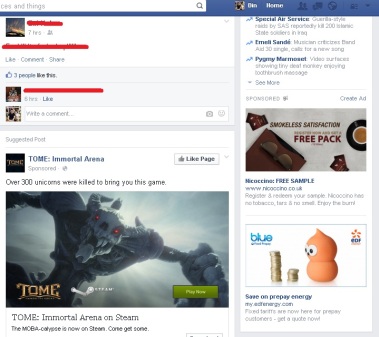The tools that humans possess require an amount of responsibility to protect oneself and others involved from being harmed in any manner possible. The internet and social media in particular are no exception and there are many reasons why one should act responsibly. This has been addressed in blog posts from previous topics such as preventing yourself from being in your future employer’s “‘reject’ pile” (Andy Sugden, 2014).
A blog post by Dr. Jim Barry addresses the ethical issues faced in today’s social media marketing. One of the issues Dr. Barry mentions is Invasion of Privacy. This issue is synonymous with being anonymous on the internet which I highlighted in my previous blog post. Before the introduction of AdBlock, surfing the web was honestly a pain. Here’s what I see on Facebook now with AdBlock paused:

I had quit playing video games over the summer and I have not bought my own box of cigarettes in almost a year (was a pack a week smoker, now barely one in a month). These advertisements were tailored to match my previous addictions and without AdBlock I would’ve gone back to my old habits. Despite the annoyance, one issue that significantly troubles me the most personally are scams.
Mike Chang’s Six Pack Shortcut is one of the most popular fitness channels on youtube but it is one of the most controversial as well. His methods have been labelled as being dishonest and misleading by the use of click-bait headlines and exaggerated health facts. What a lot of people are not happy about is the fact that he is selling information that is already free. Other popular youtube fitness channels have called out on Mike Chang’s business as a scam. Some have done so professionally while others … not so much.


Having been studying Psychology for the past half decade the harm marketing scams can do are extremely underestimated. Disappointment leads to a drop in general well-being such as self-esteem and over all happiness (in extreme cases depression) and even more so for people who already are low in self-esteem (e.g. 16 year old underweight me).
References:
An Authentic, Professional Online Profile – Andy Sugden
7 Ethical Dilemmas Faced in Social Media Marketing – Dr. Jim Barry
Anonymity: one of the most powerful inventions – Din Jaya
My Transformation & How YOU Can Get Abs – Mike Chang
Why Mike Chang of Sixpackshortcuts SUCKS – Omar Isuf
Hi there,
I have to admit, your title made me feel more than just being interested, the phrase “get six packs” gave me curiosity, making me wonder if you came up with some fitness tips. Sadly, you did not. however that’s not the point of this blog, isn’t that?
Scanning over your blog, I can see your effort to connect all of those information you have brought up, however, I believe you can make your argument much more solid with s little corrective action. For example, you brought up how your Facebook page would look like without AdBlock. Why did you not show your reader how effective the AdBlock would be if you use them, by adding 1 more picture in your blog?
Further more, I think you should have detailedly assessed how heavy the advertisements of cigarette and video games have effect on you, before your know about AdBlock. That will give it an idea of how advertisements compromise people’s behaviours.
Last thing I want to say is that you might want to have a look at your conclusion, which has a few minor errors but they might lowering the value of your paragraph.
Thank you for reading this,
Nam H.
LikeLike
Hi Din,
Following your comment on my blog this week stating that we had similar views, I thought I would read your thoughts on the topic.
I was interested to see that we both picked up on the idea that the Invasion of Privacy is unethical – from the work produced by Dr.J.Barry. I am in complete agreement with both you and Barry and feel that passing on information about our online behavior is unethical – however, others on my blog post disagreed. Your screenshot of your Facebook page without an a blocker was really useful in demonstrating our need to prevent ads directed at us being shared with us without our consent. Your inclusion of youtube vloggers posting dishonest fitness videos was interesting to me as I had only touched on editorial materials which are false such as reviews in magazines etc…
In my blog I mentioned how native advertising is a way of combatting dishonest product promotions as it clearly shows audiences that the product review or presence in the magazine / on the site has been funded by the company themselves. Do you think that a similar sort of principle is needed in the case of youtube videos such as those that you have mentioned – if they used a particular protein for example or if they had been inspired from a certain source, as you mentioned that this information is freely available on the internet. This might also help the issue of exaggerated health facts that you mentioned.
Thanks
Lucy
LikeLike
Hi Lucy, to answer your question, I do think it is needed but I don’t think it is sufficient. Personally, when I see a three minute video of “How to gain more muscle with two easy steps” and it cites a 10 page journal article backing it up, I will never find the time to read that journal article. The video is three minutes for a reason and the title was exaggerated for a reason – which is to accommodate the naive and the lazy (which surprisingly can be a lot given that someone like Mike Chang has that much subscribers). If anything I have found that a lot of scientific articles have been cited to add more credibility towards a product by nit-picking irrelevant results and conclusions. False advertising is combat-able, but laziness and naivety are not unfortunately.
LikeLike